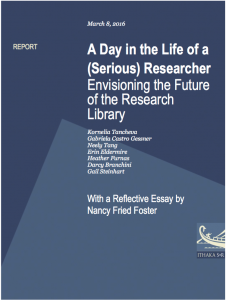“How would you design a research library to respond to the preferences and needs of today’s researchers?” were the librarians of Cornell University asking, in their quest to envision the future Research Library.
To answer to this question, the librarians had to hear from researchers themselves. They realised they had to accept the evidence and understand what research means for a researcher. Finding the researchers’ work patterns and their main struggles could be the key to finding what kind of responsibilities could the future research library assume in order to serve its purpose.
With no precedent for such an approach, the librarians had considered the following:
– The evidence: it was obvious that today’s researchers work differently than twenty years ago (for example) because of the “unpredictable change in the way information is created, stored, transmitted and used”. They had to look at their new practices, places & spaces, resources and tools, wires and equipments.
– What research requires: the research library is expected to respond to the needs and pressures of three “stakeholdes”: the common good (the research partners and the society) – knowledge flow, the institution – role in the campus and budget distribution and the individual researcher – faculty members, graduate students and undergraduate students.
– Towards the model of the Future Research Library: there are clear core practices that have to stay, like access to information – organised and findable and new services, like an increasing role in publishing or new specialties, like designing and developing new information technologies, all emerging for the library of the future.
 The librarians interviewed 21 researchers and used a mapping and logging method for their study “A Day in the Life of a (Serious) Researcher”. They focused in the interviews on different aspects of a researcher’s professional life:
The librarians interviewed 21 researchers and used a mapping and logging method for their study “A Day in the Life of a (Serious) Researcher”. They focused in the interviews on different aspects of a researcher’s professional life:
– academic activities
– seeking information
– library resources
– self management
– space
– circum-academic activities
– obstacles
– brainwork
– technology
The findings of their study and their insights bring us to one conclusion: there are so many ways the researchers do research that there is no way the library could serve all their individual needs. Instead, the analysis of all the work patterns resulted into three main spheres of practice:
- the process of research
- academic networking
- managing self
The way Cornell University Library imagined they could approach the researchers needs in these spheres of practice and empower the researchers to achieve their academic research goals lead to a model of the future Research Library as an academic hub and an app store.
You can read all about it in A Day in the Life of a (Serious) Researcher – Envisioning the Future of the Research Library.
